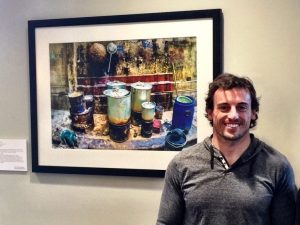Ryan Seguin ’17 MPH Reduces Health Disparities through Nutrition
April 12, 2017UNC Global Affairs

Ryan Seguin
During his first two years as an undergraduate at Utah State University, Ryan Seguin ’17 MPH planned to major in exercise and sports science. After his sophomore year, he took a two-year mission to Ghana and Cameroon through his church, and his educational and career plans changed.
“In Cameroon, I knew children who died from malnutrition,” said Seguin, who had never traveled internationally before the trip. “They didn’t have to die. The ground was fertile enough for people to grow food, but they lacked the skills and the resources to utilize the land.”
Seguin spent the bulk of the mission in Cameroon, where he learned to speak French. Upon returning to Utah, he switched his major to nutrition so that one day he could return to developing countries and participate in sustainable public health projects that would provide the knowledge and skills people needed to improve their health and opportunities. To achieve that goal, he needed further education in public health, and he applied to and was accepted by the Gillings School of Global Public Health at the University of North Carolina at Chapel Hill.
“Seeing the need for assistance and education in developing countries was a driving factor for pursuing a public health degree,” said Seguin, who also worked to rebuild schools outside Jacmel, Haiti in the aftermath of the 2010 earthquake. “After living with people in Cameroon, people I keep in touch with today, I wanted to be a part of projects whose outcomes weren’t dependent upon receiving continued funding, but instead brought skills directly to people so that they could improve their lives.”

At Gillings, Seguin has expanded his international research, examining the facilitators for and barriers to the adoption of clean-burning cook stoves in Rwanda. Through a MEASURE Evaluation program that promotes public health monitoring and evaluation in Malawi, he gauged the success of improved farming and nutrition practices after people have received relevant education.
In May, Seguin will graduate from Gillings with a master’s degree in public health and a concentration in health behavior.
“As I prepare to graduate, I leave having developed hard skills in program planning, evaluation and statistics,” he said. “I’ve also had the opportunity to work with faculty in the nutrition department and with MEASURE Evaluation and the Carolina Population Center. Chapel Hill has given me tremendous opportunities to get involved in this kind of work and to be prepared to go into the field.”
When he is not working to better the lives of communities in developing countries, Seguin will no doubt be traveling to learn more about other countries and their cultures.
“The first thing I do anywhere I go is try the food,” he said.
Two summers ago, Seguin and his spouse, Rachel, spent several months in Southeast Asia traveling with their then-year-and-a-half-old son, and this winter the couple backpacked in Costa Rica and Nicaragua with both of their boys, who were three years old and four months old, respectively.

“It’s a bit of a challenge traveling with a baby who isn’t yet sitting up,” he said, laughing. “But it’s what we love to do, and we want our sons to be exposed to other cultures and experiences.”
For Seguin, regardless of the reasons for each of his trips abroad, the best part of seeing the world is meeting people along the way.
“I love the people I’ve gotten to know in the developing countries I’ve been to,” said Seguin, an avid photographer whose photos have won the Chancellor’s Choice Award in 2015 and tied for third place overall in the 2016 Carolina Global Photography Competition at UNC. “Life is lived at a slower pace. People have time for each other. Here, you’re in your house, you leave your house to drive to school or work and you come home. Abroad, I love the ambiance. People are happy, and even if they don’t have much, they’re willing to share what they have.”
